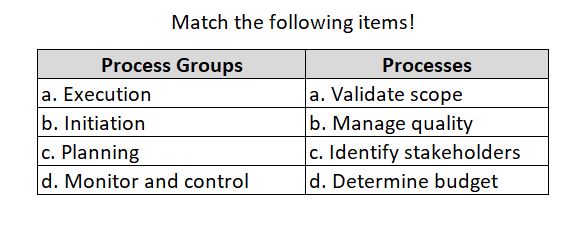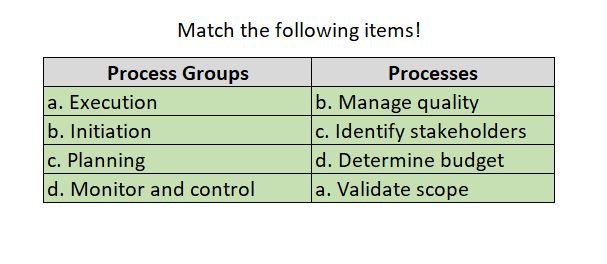The CAPM exam will undergo several changes from September 2019, which will affect the eligibility criteria for the exam, the exam conditions for the PMP qualification after CAPM certification, and a small percentage of the question types that will be asked during the CAPM test. Overall, CAPM applicants can look forward to a number of relaxations to the exam conditions.
The PMI's decisions essentially simplify the career progression of many prospective project managers who are considering the CAPM qualification as a first step, both from a preparatory and administrative point of view.

Content:
- Changes to the examination criteria
- Obtaining the PMP qualification after CAPM
- Matching question type
- Type of question indicating multiple choice
- What does not change
CHANGE OF EXAMINATION CRITERIA
As of 28 August 2019, the 1500 hours of project experience do not need to be certified. Anyone can now take the CAPM exam immediately after graduation. To pass the exam, you need only a secondary school or equivalent qualification and 23 hours of structured project management training.
Until now, candidates have been able to choose which examination criteria they meet:
- Or they can accumulate 1500 hours of project experience and certify it,
- Either have a secondary school or equivalent qualification and attend 23 hours of structured project management training.
The current change therefore concerns the first option, which is removed by the PMI. The main reason for this is that most of the candidates have not yet had 1500 hours of project management experience, and the 23 hours of project management training can be easily completed if you already have a secondary school education. ProMan Consulting's CAPM exam preparation programme certifies a total of 30 hours of training.
AFTER OBTAINING THE CAPM, OBTAINING THE PMP MAY BE EASIER
Until now, as in the case of CAPM, one of the prerequisites for PMP certification was to attend a certain number of project management courses as a prerequisite for the exam. This is 35 hours for PMP. For those candidates who already hold a CAPM qualification, this examination criterion will be removed. According to PMI, for those with a CAPM qualification, the 35 or more hours of project management training criterion is often already met, as it is very difficult to cover 900 pages of course material in less time. Nevertheless, proof of a minimum of 4500 hours of project management experience over 3 years (or 7500 hours over 5 years if the highest level of education is a baccalaureate) is still a requirement for PMP. This gives CAPM certification holders a big leg up in their career progression. However, it is still recommended to attend some kind of training/workshop before obtaining the PMP, as there are fundamental differences between the exams of the two qualifications. This facilitation could be of real benefit to those who have a gap of around 1-1.5 years between the two qualifications.
INTRODUCTION OF NEW QUESTION TYPES
In a move to improve the exam, PMI is introducing two new types of questions from September. These new question types will make up only a small percentage of the exam questions.
Matching questions
In this type of question, candidates will see two lists side by side, and the task is to connect the related items in the two separate lists. For example, pairing Process Groups and Processes, or pairing Knowledge Areas and Tools, or pairing Processes and Outputs, etc.
An imaginary example with the question on the left and the correct answer on the right:

Imaginary question from the new pairing type.

Solving imaginary matching questions.
Multiple choice questions
This type of question will presumably be very similar to the currently known test questions, where you had to choose the correct answer from a list of 4 possible answers. This question type will be different in that more than one answer choice can be correct, so all correct answer choices must be marked.
To use an imaginary example:
Identify all Tools and Techniques that a project manager can use during the Estimate costs process:
- a) Expert judgement
- b) PMIS
- c) Decision making
- d) Meetings
Solution: options a), b), and c) are correct, while option d) is not a cost estimation tool under the PMBOK.
What remains unchanged
The exam material will continue to be the sixth edition of the PMBOK, and the 3-hour, 150-question exam will continue to be conducted in the same way. That said, if you have the opportunity, make sure you take the exam before 28 August, as the mere fact of the new questions and changes may be enough for some aspirants to put a psychological burden on their exam results.

 Designabc
Designabc